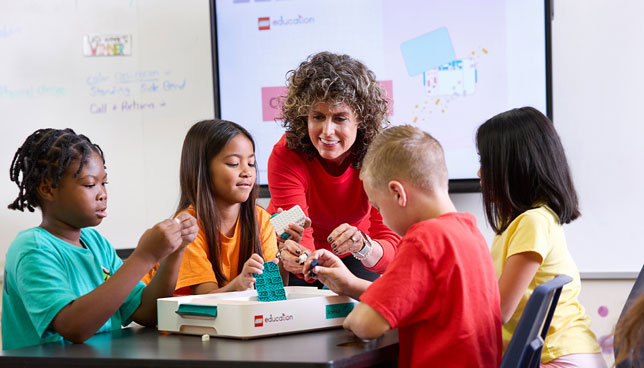LEGO Education Debuts Science Kits for Hands-on Learning
LEGO Education has announced a new learning solution to engage students in hands-on science learning. Available in three kits by grade band, LEGO Education Science provides 120-plus standards-aligned science lessons, teacher materials, and select LEGO bricks and hardware. Each kit is designed for up to four students to work together on topics such as biomimicry, ways the impact of natural events can be reduced, changes in kinetic energy, and more.
 LEGO Education Science
LEGO Education Science
Kit components and pricing are as follows:
LEGO Education Science Kit K-2 ($329)
- 277 LEGO bricks
- 1 double motor
- USB charging cable
- Building instructions
LEGO Education Science Kit 3-5 ($399)
- 335 LEGO bricks
- 1 double motor
- 1 controller
- 2 connection cards
- USB charging cable
- Building instructions
LEGO Education Science Kit 6-8 ($499)
- 424 LEGO bricks
- 1 single motor
- 1 double motor
- 1 controller
- 1 color sensor
- 3 connection cards
- USB charging cable
- Building instructions
Teacher resources for the kits, available through the online Teacher Portal, include getting started materials, lessons, standards mapping, facilitation notes, and ready-to-teach class presentations.
Throughout their development, the kits were tested by more than 3,000 students in 100-plus classrooms. As tester Jill Snodgrass, a fourth-grade math and science teacher at Kernan Trail Elementary in Florida, recounted: "It was inspiring to see my students' enthusiasm and creativity flourish. The tactile nature of working with LEGO bricks helps solidify their understanding by connecting abstract concepts to tangible outcomes. They were so excited to see their finished build for the lesson, especially when the rattlesnake used its shaking tail to ward off predators. Their collaboration and joy were truly a highlight of the day."
"One of the most powerful things we can do as educators is to instill a lifelong love of learning in our students," commented Andrew Sliwinski, head of product experience at LEGO Education. "LEGO Education Science supports educators across the world to bring science standards to life in a new way with ready-made lessons and high quality, reusable LEGO bricks and hardware. I can't wait to see these learning experiences in the hands of students."
For more information, visit the LEGO Education site.
About the Author
Rhea Kelly is editor in chief for Campus Technology, THE Journal, and Spaces4Learning. She can be reached at [email protected].